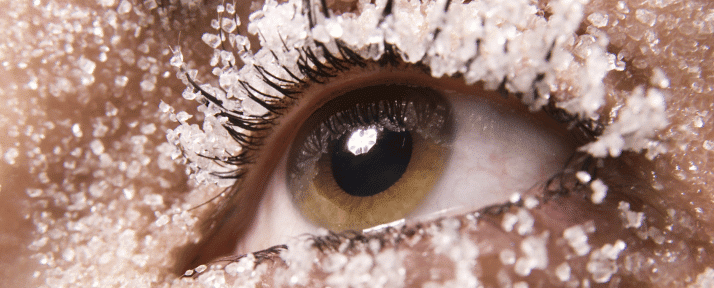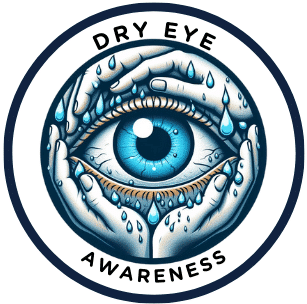
Dry eyes are a common condition that affects millions of people worldwide. It occurs when the eyes do not produce enough tears or when the tears evaporate too quickly, resulting in discomfort and irritation. While winter dry eyes can happen at any time of the year, it is more prevalent during the winter months.
During the winter, the air is colder and drier, and indoor heating systems can dehydrate the air even further. This lack of humidity can cause the eyes to dry out and become irritated. Additionally, cold winds can cause the tears to evaporate more quickly, leading to dry eyes. These factors can be particularly problematic for individuals who already have dry eye syndrome or other underlying eye conditions.

If left untreated, dry eyes can lead to more severe complications. Therefore, it is essential to take proactive steps to prevent and treat dry eyes during the winter months. In the next sections, we will explore the causes, symptoms, and treatment options for winter dry eyes.
Understanding Dry Eyes in Winter

Dry eyes are a common condition that can occur in any season but are particularly prevalent in winter. During the colder months, the air is drier, and indoor heating systems can further reduce the humidity levels in the air. This can lead to a decrease in tear production, causing the eyes to become dry, irritated, and uncomfortable.
Causes of Winter Dry Eyes
Several factors can contribute to dry eyes in winter, including:
- Low humidity levels: Cold air holds less moisture than warm air, and indoor heating systems can further reduce humidity levels in the air.
- Wind: Cold, windy weather can cause tears to evaporate more quickly, leading to dry eyes.
- Sun exposure: The winter sun can be intense and cause eye irritation, especially when reflecting off snow or ice.
- Contact lenses: Contact lenses can exacerbate dry eye symptoms, particularly in winter when the air is drier.
- Age: As people age, tear production can decrease, leading to dry eyes.
Symptoms of Winter Dry Eyes
The symptoms of dry eyes in winter can vary from person to person, but some common signs include:
- A gritty or scratchy feeling in the eyes
- Redness and inflammation
- Blurred vision
- Sensitivity to light
- Excessive tearing
- Eye fatigue
If left untreated, dry eyes can lead to more severe complications, such as corneal ulcers, infections, and vision loss. Therefore, it is essential to seek medical attention if symptoms persist or worsen.
In summary, dry eyes in winter are a common condition that can be caused by several factors, including low humidity levels, wind, sun exposure, contact lenses, and age. The symptoms of dry eyes can vary but may include a gritty feeling in the eyes, redness, blurred vision, and sensitivity to light. Seeking medical attention is crucial to prevent more severe complications.
Preventing Winter Dry Eyes

Lifestyle Changes
Making some simple lifestyle changes can help prevent winter dry eyes. Here are some tips to follow:
- Drink plenty of water and stay hydrated. This helps keep the body and eyes hydrated.
- Use a humidifier to add moisture to the air. This can help prevent dryness caused by indoor heating.
- Avoid smoking and exposure to secondhand smoke, which can cause eye irritation.
- Wear sunglasses or goggles to protect the eyes from wind and cold temperatures.
- Eat a healthy diet that includes foods rich in omega-3 fatty acids, such as salmon, flax seed, and walnuts.
Eye Care Products
Using the right eye care products can also help prevent winter dry eyes. Here are some products to consider:
- Artificial tears: These over-the-counter eye drops can help lubricate the eyes and reduce dryness and irritation.
- Eye ointments: These products can help provide long-lasting relief for severe dry eyes.
- Warm compresses: Applying warm compresses to the eyes can help reduce redness and discomfort.
It’s important to talk to a doctor or eye care professional before using any new eye care products, especially if you have any underlying health conditions or allergies.
By following these simple lifestyle changes and using the right eye care products, it’s possible to prevent winter dry eyes and enjoy the season without discomfort.
Treatment Options for Winter Dry Eyes

Winter dry eyes can be a frustrating and uncomfortable condition to deal with. Fortunately, there are several treatment options available to help alleviate the symptoms. Treatment options can be divided into two categories: medical treatments and home remedies.
Medical Treatments
If the symptoms of winter dry eyes persist or worsen, it may be necessary to seek medical treatment. Some medical treatments include:
- Prescription eye drops: These eye drops are designed to increase tear production or reduce inflammation in the eye. They may contain steroids or other medications to help alleviate symptoms.
- Punctal plugs: These are tiny plugs that are inserted into the tear ducts to help keep tears from draining away too quickly. They can help keep the eyes moist and reduce dryness.
- Intense pulsed light therapy: This therapy uses a special light to help stimulate the production of oil in the meibomian glands, which can help reduce dryness and improve tear quality.
It is important to consult with an eye doctor before starting any medical treatments.
Home Remedies
In addition to medical treatments, there are several home remedies that can help alleviate the symptoms of winter dry eyes. Some home remedies include:
- Using a humidifier: Adding moisture to the air can help reduce dryness and improve eye comfort.
- Blinking more frequently: This can help spread tears over the surface of the eye and reduce dryness.
- Applying warm compresses: Placing a warm, damp cloth over the eyes can help reduce inflammation and improve tear production.
- Avoiding irritants: This includes things like smoke, wind, and dry air, which can all contribute to dryness.
Overall, there are several treatment options available for winter dry eyes. By consulting with an eye doctor and using a combination of medical treatments and home remedies, it is possible to alleviate symptoms and improve eye comfort.
Living with Winter Dry Eyes

People who experience dry eyes during the winter months may find it uncomfortable and frustrating. However, there are ways to manage and prevent dry eyes. Here are some daily management and long-term strategies for living with winter dry eyes.
Daily Management
There are several ways to manage dry eyes on a daily basis. These include:
- Using a humidifier: Adding moisture to the air can help prevent dry eyes. Using a humidifier in the home or office can help keep the air moist and comfortable.
- Using artificial tears: Artificial tears are eye drops that can help lubricate the eyes and provide relief from dryness and irritation. They are available over-the-counter and can be used as needed throughout the day.
- Avoiding irritants: People with dry eyes should avoid irritants such as smoke, wind, and air pollution as much as possible. They should also avoid rubbing their eyes, as this can make dryness worse.
- Blinking regularly: Blinking helps to spread tears over the surface of the eye and keep them moist. People who work on computers or other screens for long periods should take breaks to blink and rest their eyes.
Long-Term Strategies
In addition to daily management, there are also long-term strategies that can help prevent dry eyes from occurring in the first place. These include:
- Eating a healthy diet: A diet rich in omega-3 fatty acids, such as those found in fish, nuts, and seeds, can help prevent dry eyes. Drinking plenty of water can also help keep the body hydrated.
- Taking breaks from screens: People who work on computers or other screens for long periods should take breaks every 20 minutes to rest their eyes. They should also position their screens so that they are at eye level and not too close to their face.
- Protecting the eyes: People who spend time outdoors in the winter should wear sunglasses or goggles to protect their eyes from wind and cold air. They should also wear a hat with a brim to shield their eyes from sun glare and snow reflection.
By following these daily management and long-term strategies, people with winter dry eyes can find relief and prevent dryness from occurring in the first place.
Conclusion

In conclusion, dry eyes are a common problem during the winter season due to low humidity levels and cold weather. People who spend a lot of time outdoors or use indoor heaters are at a higher risk of developing dry eyes. The symptoms of dry eyes include redness, itching, burning, and blurred vision.
To prevent dry eyes during the winter season, individuals can take several steps such as using a humidifier to increase the humidity levels indoors, avoiding exposure to dry air, and wearing protective eye wear when outdoors. It is also important to stay hydrated by drinking plenty of water and eating foods rich in omega-3 fatty acids, such as fish and nuts.
If the symptoms of dry eyes persist, individuals should consult their doctor or an eye specialist. They may recommend using eye drops or other treatments to relieve the symptoms. It is essential to take care of one’s eyes, especially during the winter season, to avoid complications and maintain good eye health.
Frequently Asked Questions

How can I prevent dry eyes during the winter months?
To prevent dry eyes during the winter months, it is recommended to use a humidifier to add moisture to the air. This can help to prevent the air from becoming too dry, which can cause your eyes to lose moisture. Additionally, it is important to stay hydrated by drinking plenty of water and using eye drops to keep your eyes moist.
What are the best eye drops for treating dry eyes in winter?
There are several types of eye drops that can be used to treat dry eyes in winter. It is recommended to use eye drops that are specifically designed for dry eyes, such as those that contain artificial tears. It is important to avoid eye drops that contain preservatives, as they can cause further irritation.
What are the symptoms of dry eyes in winter?
The symptoms of dry eyes in winter can include redness, itching, burning, and a gritty feeling in the eyes. Additionally, you may experience blurred vision, sensitivity to light, and eye fatigue.
Are there any home remedies for treating dry eyes in winter?
Yes, there are several home remedies that can be used to treat dry eyes in winter. These include applying a warm compress to the eyes, using a humidifier, drinking plenty of water, and eating foods that are rich in omega-3 fatty acids.
What are the causes of dry eyes during the winter season?
Dry eyes during the winter season are often caused by the cold, dry air. Additionally, exposure to wind and sunlight can also contribute to dry eyes. Other factors that can cause dry eyes include aging, hormonal changes, and certain medications.
How can I protect my eyes from the harsh winter weather?
To protect your eyes from the harsh winter weather, it is recommended to wear sunglasses or other protective eye wear when you are outside. Additionally, you should avoid rubbing your eyes, as this can cause further irritation. Finally, it is important to stay hydrated by drinking plenty of water and using eye drops to keep your eyes moist.
